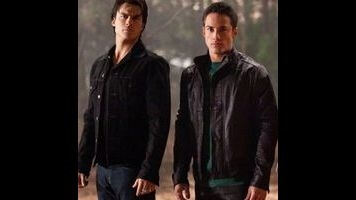The Vampire Diaries: “1912”

I’m excited to have the chance to write about The Vampire Diaries during a particularly interesting time in the series, with Carrie away tonight. After all, I enjoy writing about the structure of serialization, and for a while, The Vampire Diaries was doing something I hadn’t seen before: raising the pace without losing focus.
My previous theory, built off Battlestar Galactica specifically, was that you can’t constantly have relevant cliffhangers without losing tension—unless you’re actually willing to kill or dramatically change the characters you’re threatening. The Vampire Diaries was doing this. Caroline became a vampire; Isobel, Anna, Jenna, John, Mason, and Lexi all died; Stefan and Damon switched roles for a bit—yes, it was all working. But that’s slowed down in the third season, in large part because certain characters have become untouchable. We know that Elena, Caroline, Bonnie, Stefan, and Damon aren’t going to die. That makes the show a little more difficult, but that’s not the main problem.
The primary problem is Klaus. He’s been the show’s chief villain for over a year now, and the show’s other characters have spent that time trying to find a way to kill him. He’s virtually invincible, but evil enough that they have to try. For the story to be at all satisfying, some method of killing Klaus must exist. But every few episode it gets tried, and it fails. First the Bonnie/Elijah attempt, then Michael’s attack, then Esther’s—all failing. As such, the show feels like it’s spinning its wheels. Klaus has been built up to be the ultimate bad guy, so he can’t simply be supplanted. “All My Children” took this to fairly ridiculous extremes, with the reveal of Yet Another Klaus-Killing Magical Thingy mere minutes after the failure of the prior attempt. What makes it worse is that the show had a wonderful mechanism for fixing this problem—turn the Originals back human without killing them—and didn’t pull the trigger.
So here we are, heading into the final third of this season, and I think the show has basically pushed itself into a corner where it has to kill or severely weaken Klaus, or else it’ll just turn into a slightly serialized procedural. Tonight’s episode, “1912,” doesn’t have to pick up the pieces—it has to start knocking them down.
The show’s off to a good start. For one thing, the name “Klaus” isn’t even mentioned, as far as I could see or hear. Rebekah was around, annoyingly chasing hints about the existence of the new Klaus-killing tree, but nothing beyond that. Instead, “1912” focuses on two of more important subplots from this third season: Stefan’s struggles with himself (and Damon), and the murders of the Founder’s Council.
In both cases, the show takes important steps forward. In terms of Stefan and Damon, their busted relationship has been at the core of The Vampire Diaries, so we’ve seen a lot of this before. But I suspect that it always will be the core, so we’ll see different variations. Here we have Damon trying to push Stefan into drinking a little blood, but saying that he’ll be there to pull Stefan back from his Ripper brink—unlike the last time, which as the flashback reveals, was when Stefan lost his Lexi-based training and became the Ripper that Klaus and Rebekah knew. (The flashbacks also introduce an old vampire named Sage, a redheaded woman who encouraged Damon to enjoy his vampiric seduction. She doesn’t have a lot to do, and is clearly being set up to become a recurring character.)
The bigger shift comes from Elena’s reaction to Stefan and Damon, and this is what’s most interesting. After seeing Stefan and Damon sharing a woman for dinner, she and Matt have a long, heart-to-heart conversation about why she’s so into vampires. And she—or the writers—have a breakthrough. She doesn’t say she’s with Stefan because it’s true love, or it’s meant to be, or whatever idiot certainties a teenager in love has. She says it’s because, as a vampire, he was safe. Her parents died; someone who wouldn’t die was appealing.
Sure, the chronology here doesn’t line up with what we saw in early season one, but that’s not why this appeals to me. It appeals to me because it grants Elena agency as a character. In the later episodes of season two, she used her potential suicide in order to reclaim agency from every other character who wanted to take it away from her and use her. Here, she has room to separate herself from the Salvatore brothers and define herself outside of her romantic engagements. For all the strides The Vampire Diaries has made in terms of storytelling, I didn’t expect it to question the puppy love at its core. This is promising.
I’m less optimistic about the serial-killer storyline. Alaric, shot in the biggest cliffhanger over the winter break, wakes up in prison. Meredith Fell has implicated him for the Council murders, but by the end of the episode, in conjunction with the Salvatore flashbacks, it becomes clear that Ric has gone insane, or blacked out, or something, likely due to his resurrection ring.
This is some tense and sad stuff, but I’m not sure where it leads. Alaric is one of the more expendable cast members, so if this is a means to tragically remove him from the show, I can understand. Perhaps it’s leading to something more tragic involving Jeremy. I don’t understand why the ring-holders try to kill Council members, either, so I guess I should keep a lid on my confusion and see where The Vampire Diaries is taking this plot.
Both directions are welcome, regardless. Let’s leave the Originals aside for a while. These are interesting enough characters that they don’t require a consistently escalating storyline to hold our attention. Bigger isn’t always better.